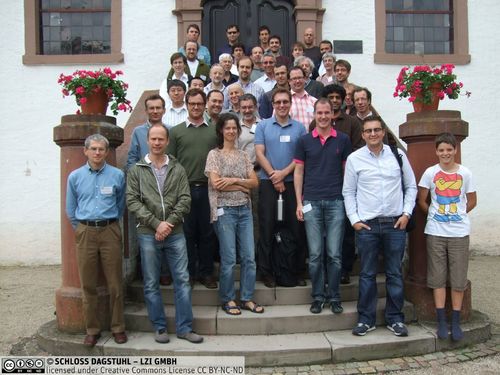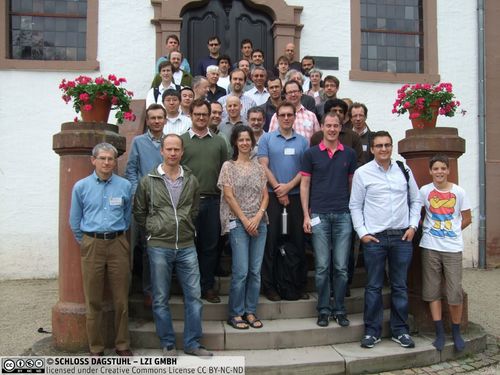Dagstuhl Seminar 11291
Mathematical and Computational Foundations of Learning Theory
( Jul 17 – Jul 22, 2011 )
Permalink
Organizers
- Matthias Hein (Universität des Saarlandes, DE)
- Gabor Lugosi (UPF - Barcelona, ES)
- Lorenzo Rosasco (MIT - Cambridge, US)
- Stephen Smale (City University - Hong Kong, HK)
Contact
- Annette Beyer (for administrative matters)
Schedule
The study of learning is at the very core of the problem of intelligence both in humans and machines. We have witnessed an exciting success story of machine learning in recent years.
Among other examples, we now have cars that detect pedestrians, and smart-phones that can be controlled simply by our voices. Indeed, aside from the increase in computational power and availability of large amount of data, the key to these successes has been the development of efficient learning algorithms based on solid theoretical foundations. As the science and engineering of learning move forward to understand and solve richer and more articulated classes of problems, broadening the mathematical and computational foundations of learning becomes essential for future achievements.
The main goal of our seminar was to account for the newest developments in the field of learning theory and machine learning as well as to indicate challenges for the future. This seminar was in the same spirit of two very successful conferences titled `Mathematical Foundations of Learning Theory'', organized in 2004 in Barcelona and 2006 in Paris. The seminar brought together leading researchers from computer science and mathematics to discuss the state of the art in learning and generate synergy effects between the different usually disconnected communities. This Dagstuhl seminar has been the first to cover the full range of facets of modern learning theory.
The seminar has focused on three main topics, while trying to keep a broader view on all recent advances. The three main topics were: 1) the role of sparsity in learning, 2) the role of geometry in learning, and 3) sequential learning and game theory. Experts in each field gave tutorials on each topic, covering basic concepts as well as recent results.
The meeting was hold in a very informal and stimulating atmosphere. The participants all agreed that such a seminar should be come a regular meeting.
We thank Annette Beyer and Claudia Thiele for their continuous support and help in organizing this workshop. Moreover, we would like to thank the staff at Schloss Dagstuhl for making this seminar such a remarkably enjoyable event. Special thanks go to Elisabeth Chaverdian for her wonderful piano concert with excerpts from her current program of the works of Liszt.
- Mikhail Belkin (Ohio State University - Columbus, US) [dblp]
- Robert J. Bonneau (AFOSR - Arlington, US)
- Sebastien Bubeck (Autonomus University of Barcelona, ES) [dblp]
- Joachim M. Buhmann (ETH Zürich, CH) [dblp]
- Rui M. Castro (TU Eindhoven, NL)
- Nicolò Cesa-Bianchi (University of Milan, IT) [dblp]
- Andreas Christmann (Universität Bayreuth, DE)
- Matthias Hein (Universität des Saarlandes, DE) [dblp]
- Jürgen Jost (MPI für Mathematik in den Naturwissenschaften, DE) [dblp]
- Gerard Kerkyacharian (University Paris-Diderot, FR)
- Vladimir Koltchinskii (Georgia Institute of Technology - Atlanta, US)
- Lek-Heng Lim (University of Chicago, US) [dblp]
- Gabor Lugosi (UPF - Barcelona, ES) [dblp]
- Stephane Mallat (Ecole Polytechnique - Palaiseau, FR) [dblp]
- Facundo Memoli (Stanford University, US) [dblp]
- Hari Narayanan (MIT - Cambridge, US)
- Robert D. Nowak (University of Wisconsin - Madison, US) [dblp]
- Guillaume Obozinski (ENS - Paris, FR) [dblp]
- Sergei Pereverzyev (RICAM - Linz, AT) [dblp]
- Tomaso Poggio (MIT - Cambridge, US)
- Massimiliano Pontil (University College London, GB) [dblp]
- Alexander Rakhlin (University of Pennsylvania, US)
- Holger Rauhut (Universität Bonn, DE) [dblp]
- Philippe Rigollet (Princeton University, US) [dblp]
- Lorenzo Rosasco (MIT - Cambridge, US) [dblp]
- Bernhard Schölkopf (MPI für Intelligente Systeme - Tübingen, DE) [dblp]
- Shai Shalev-Shwartz (Hebrew University - Jerusalem, IL) [dblp]
- Yoram Singer (Google Inc. - Mountain View, US) [dblp]
- Stephen Smale (City University - Hong Kong, HK)
- Ingo Steinwart (Universität Stuttgart, DE) [dblp]
- Gilles Stoltz (ENS - Paris, FR)
- Alexandre Tsybakov (UPMC - Paris, FR) [dblp]
- Sara van de Geer (ETH Zürich, CH) [dblp]
- Alessandro Verri (University of Genova, IT)
- Ulrike von Luxburg (Universität Hamburg, DE) [dblp]
- Martin J. Wainwright (University of California - Berkeley, US) [dblp]
- Robert C. Williamson (Australian National University, AU) [dblp]
- Tong Zhang (Rutgers University - Piscataway, US) [dblp]
- Ding-Xuan Zhou (City University - Hong Kong, HK) [dblp]
Related Seminars
- Dagstuhl Seminar 15361: Mathematical and Computational Foundations of Learning Theory (2015-08-30 - 2015-09-04) (Details)
Classification
- artificial intelligence
- algorithms
- optimization
Keywords
- learning theory
- machine learning
- sparsity
- high-dimensional geometry
- manifold learning
- online learning
- reinforcement learning



